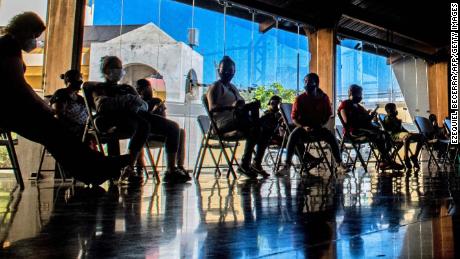Costa Rica mandated Covid-19 vaccines for children. But not everyone’s on board

Inside the St. Vincent de Paul Hospital in Costa Rica’s Heredia province, not far from the capital San Jose, the argument — over the country’s Covid-19 vaccine mandate — came to blows last week, leading to the arrests of seven people.But this fight proved more consequential than for just the people involved: The incident forced authorities to temporarily close the hospital’s doors, marking a dark moment in the country’s fight against “The collective good supersedes the rights of the individual,” Hayes said. Not all lawmakers agree — although they, too, appear to be in the minority. One of the most vocal of those objectors is independent lawmaker Erick Rodríguez Steller, who has called the mandate “nonsense,” saying that it leaves Costa Rica under a “sanitary dictatorship.” While Rodríguez says that he doesn’t condone the violence that took place at the Heredia hospital, he said that the father had every right to prevent his child from getting vaccinated. Rodríguez expressed his opposition to the mandate in congress last week, saying that “the state shouldn’t be in the business of deciding how we raise our children.”He later told CNN that he has been vaccinated, that he believes in science and that he is not an “anti-vaxxer” — even if local media alleges the father of the boy at the center of the controversy is. Rodríguez said that he believes there has not been enough information around risks of vaccines for children — and that he and others who are opposed to the mandate just want to find out the “truth” about any potential risks.Studies around the world have concluded that the Covid-19 vaccines are safe for children, with the US Centers for Disease Control and Prevention recommending them for children ages 5 and older.And in Latin America, Cuba, Chile and Argentina have been running successful child vaccine campaigns for months. Still, governments around the world have largely shied away from mandatory vaccinations, opting instead for incentives to motivate people to get shots.Even in authoritarian states, including China — where vaccines are approved for children from the age of 3 — they are not mandatory. That tide could be turning in Europe, however. On Friday, Austria became the first European nation to impose a vaccine mandate on its adult population. Some say the mandates are testing the boundary between public health and civil liberties, adding to tensions between those who are vaccinated and those who are not.Rodríguez, the independent legislator, said he doesn’t fully rule out supporting a mandate, but that it must have the consensus of congress. “When it comes to restricting rights and liberties, you have to go through the Legislative Assembly, and here, health authorities have ignored us,” he said.Hayes insists the mandate is not about restricting liberties, but ensuring the public good, especially when there’s a vaccine that has been proven safe and effective around the world.”Let’s keep alive the Costa Rican tradition of believing in vaccines, believing in science and believing in doctors who are treating patients with their best interest in mind, because these vaccines save lives,” he said.Djenane Villanueva in San José, Costa Rica contributed to this report.







